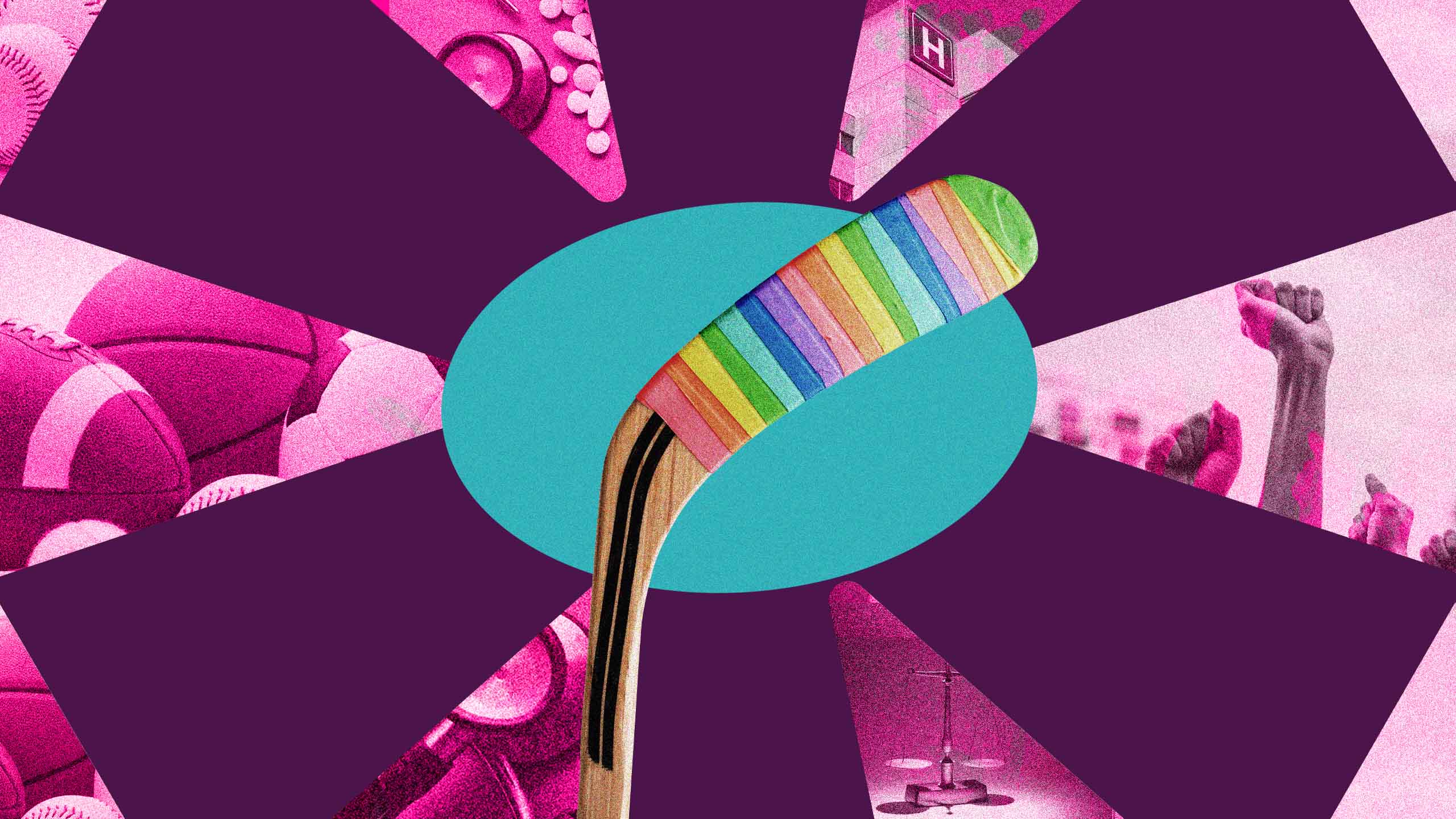On Tuesday, the NHL instituted a new rule barring team “theme nights,” disallowing everything from Pride games to military appreciation events. As a result, Pride Tape—rainbow tape used on players’ sticks during games—has also been banned. The bans came after a small handful of players objected to participating in Pride nights last season, which frequently feature rainbow-coloured warm-up jerseys meant to show support for the LGBTQ2S+ community.
The league has struggled to respond to the growing backlash against queer and trans lives amidst a global revanchist movement set on rolling back the clock on our rights. The ban on Pride Tape is perhaps the league’s most ridiculous move to date.
Previously, the NHL allowed individual players to be exempt from their usual rules against tape colours other than white or black, provided they wanted to use the rainbow tape. That is no longer allowed. An NHL spokesperson told ESPN this week that the ban on Pride Tape is meant to bar individual players from doing an “end around” on the rules against theme nights.
It’s yet another blow to queer fans who are left wondering if they truly have a place within the sport. The You Can Play project, an organization promoting LGBTQ2S+ inclusion in sports, said in a statement this week: “If hockey is for everyone, this is not the way forward.… We are now at a point where all the progress made, and relationships established with our community, is in jeopardy.”
The issue started last year, when protests and boycotts of companies supporting trans lives became a fashionable trend among religious conservatives. Bud Light infamously saw their sales base collapse after conservative media exploded over trans influencer Dylan Mulvaney filming a single Instagram ad. Target also became an enemy of conservatives, many of whom filmed themselves harassing employees and customers at the stores over their annual Pride section.
Last year, the NHL had to figure out how to handle a small number of players who objected to acknowledging LGBTQ2S+ lives, several of whom were from Russia, where so-called “LGBT propaganda” is illegal.
Instead of coming out with a decisive policy, the league lurched about, with some teams cancelling Pride nights altogether—the issue became much larger than it had to be. After the NHL attracted much-deserved criticism from LGBTQ2S+ rights groups and fans for its lacklustre response, the league opted to go one step further and ban themed nights altogether, rather than acknowledge LGBTQ2S+ people at all. Along with Pride nights, there can no longer be military appreciation nights or even “Hockey Fights Cancer” nights, all of which were annual events for many teams in previous years.
“The league’s policy allows a tiny minority of players to dictate how the rest of professional hockey expresses itself when it comes to LGBTQ2S+ issues.”
It’s pretty clear that the NHL meant this as a solution to their political problem, but it leaves me, as a queer sports fan, feeling singled out. Because other people disagree with my right to exist, now the NHL can’t celebrate any causes at all? Yeah, Mr. Hockey Exec, that makes me feel great about myself, good job!
The league’s policy allows a tiny minority of players to dictate how the rest of professional hockey expresses itself when it comes to LGBTQ2S+ issues. One of the objections raised frequently last year was that homophobic and transphobic players felt pressured to take part in Pride events that they disagreed with. It would be a very normal solution to just allow these players to just not participate in such events, but such a policy would publicly expose players for their potentially odious political beliefs.
Instead, the new policy leaves pro-inclusion players out on a limb. “I’ve enjoyed all the nights that we’ve celebrated here in Edmonton, whether that’s Pride night or military night or Indigenous night, all the various nights that we’ve had and had a chance to celebrate. I’ve always enjoyed them. I can’t speak for anyone else or the league,” Edmonton Oilers captain Connor McDavid told reporters Wednesday. “In terms of a league standpoint, is it something that I’d like to see put back into place one day? Certainly. You know, but that’s not the way it is right now.”
McDavid is among a number of players who expressed disappointment at the league’s decision. “It is a sensitive subject for some people. I don’t understand why,” Calgary Flames defenceman Rasmus Andersson said to TSN reporter Salim Nadim Valji. “It’s not just Pride Tape, it’s Hockey Fights Cancer, that’s a big one. We’ve just got to find different ways to support it. It’s something so natural to me, so I don’t understand it.”
Pride Tape co-founder Dr. Kristopher Wells said Wednesday that a number of players have expressed interest this week in buying the tape, so perhaps an impromptu player protest may still be in the works.
But the league’s decision still seems overly restrictive. In order to protect the feelings of homo- and transphobic players, the league now bans the most visible expression of LGBTQ2S+ support in the entire game. Make it make sense.
The bottom line is that sports, particularly men’s professional team sports, has never really been a queer-inclusive space. Openly gay professional athletes are exceptionally rare on the men’s side, and queer fans can sometimes be seen as an afterthought, even as they bought rainbow-themed team merch in droves. But by ceding so much ground to a small minority of players on this, the NHL shows where its true priorities lie.
As trans pro hockey player Harrison Browne recently tweeted, “Visibility saves lives.” The NHL has made it clear: queer and trans lives do not matter to the league’s executives.


 Why you can trust Xtra
Why you can trust Xtra


